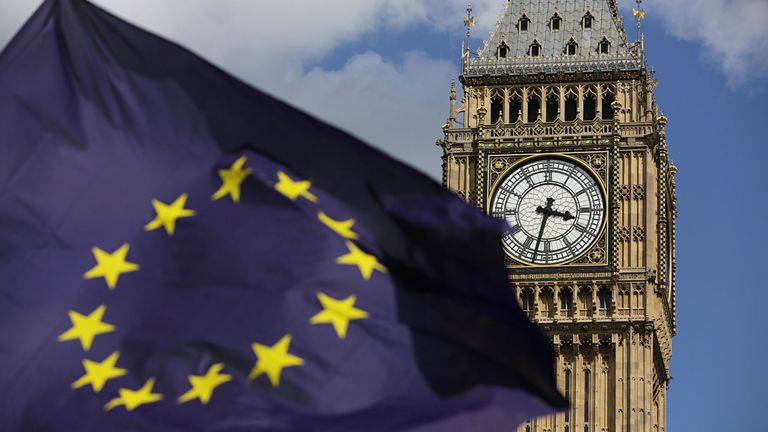Theresa May has no legal power to start Brexit, High Court told
If judges decide there must be a vote in Parliament then the possibility of MPs defying the result of the referendum is raised.
Thursday 13 October 2016 21:13, UK
Theresa May does not have the legal power to trigger Article 50 and start the Brexit process, the High Court has been told.
The claim was made by a barrister representing London businesswoman Gina Miller, who is leading a group challenging the Prime Minister's right to start Britain's exit from the European Union without a vote in Parliament.
Lord Pannick QC accused Mrs May of attempting to kick-start proceedings unlawfully using ancient executive powers which for centuries were vested in the monarchy.
Ms Miller is an investment fund manager and philanthropist living in London who voted Remain in the 23 June EU referendum.
Speaking on her behalf, Lord Pannick told three judges in a packed courtroom on Thursday the case "raises an issue of fundamental constitutional importance concerning the limits of the power of the Executive".
He argued Mrs May could not use royal prerogative powers to remove rights established by the European Communities Act 1972, which made EU law part of UK law, as it was for Parliament to decide whether or not to maintain those statutory rights.
The QC added it was wrong to suggest the legal challenge was "merely camouflage" for those who wanted to remain.
Mrs Miller told Sky News: "We have a parliament that is sovereign. We have a functioning democracy.
"Are we now saying that we can go back to 19th-century, 18th-century politics where governments can overrule parliaments and take away people's rights, which will happen when we leave the EU.
"For me that is a very dangerous place to go."
- 'interested parties', in legal speak - and the case will pitch some of the finest legal minds in the nation against each other.
Attorney General Jeremy Wright QC will help fight the case for the Government, saying the result of the referendum has to be respected and royal prerogative means no parliamentary vote or act is needed before triggering Article 50.
Ministers have accused those bringing the case of trying to thwart Brexit.
Conservative MP Bernard Jenkin, who is chair of the Public Administration and Constitutional Affairs Committee, argues that "treaty matters have always been done by royal prerogative", and that Article 50 is a treaty matter.
He adds: "Among those involved in the court case are a great many people who want to frustrate the UK from leaving the European Union or maintain a half in, half out solution.
"I think they want to protract the agony and uncertainty when in fact what business wants is certainty and a clear direction. And I think that is why the Government is resisting it."
The case is being heard over three days at the High Court, but given its constitutional importance will almost certainly move to the Supreme Court before the end of the year.
If judges decide there must be a vote in Parliament then the possibility of MPs defying the result of the referendum is raised.
The majority of MPs campaigned to stay in the EU and they could vote to block the very start of the process which the majority of constituents backed.
The courts could make politics very difficult in the coming weeks.





